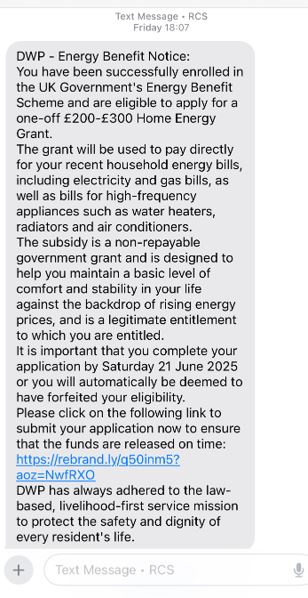Urgent Fraud Alert: Consumers warned about fake ‘energy allowance’ text messages

Bank of Ireland is reminding consumers to keep their personal and financial information secure following increased reports of scam text messages circulating that urge people to ‘apply’ for their ‘Energy Allowance’ , ‘Winter Subsidy’ and ‘Winter Fuel Payment’.
The messages can appear to come from the Department of Work & Pensions (DWP) and invite recipients to click on a link which takes them to a fake, but very legitimate looking, website where their personal and banking details are then collected by the fraudsters.
However, the DWP never send text messages or emails requesting bank details for Winter Fuel Payment purposes and, the vast majority of the Winter Fuel Payments are made automatically without the need to claim.
Allison Ewing, Fraud Manager for Education & Awareness in Bank of Ireland UK said: “We are seeing a concerning pattern in this type of fraud, so we need our customers and the general public to be alert, recognise the warning signs and remember to keep their personal and financial information safe. Our main advice is don’t click on a link or attachment sent from an unsolicited text and never share your bank account or card details with a cold caller. And remember, even if you think you might have been the victim of a scam, contact your bank immediately so they can take action to help you.”
When it comes to unsolicited text messages, Bank of Ireland advises customers to: Stop, Think and Check.
Stop:
- Never click on links or attachments in unexpected text messages – you could be downloading software that can enable fraudsters to access your phone or computer. Do not input your personal or financial information.
- Don’t feel pressured to take action immediately – a legitimate company won’t mind you taking time to confirm the details independently.
Think:
- Who is contacting me and why? What will they do with this information?
- Keep your bank card and bank account details secure – never share your details with a cold caller who advises they need them for any reason.
Check:
- Verify any advice with the government department directly – their official website will have details of the correct process to follow. Find their website using an independent online search – don’t click on links provided in a text message, email or social media post.
- If you get an unsolicited email, call or text, which asks for your personal or financial details do not send or share them – contact the company, using a number confirmed from the company website to confirm if the request is legitimate.
Remember, if you think you have shared your banking details, contact your bank immediately.
Bank of Ireland’s fraud team are available to support customers 24/7 and can be contacted on the Freephone line 0800 121 7790 or dialing 159, the memorable short code number that connects consumers safely with their bank.
More advice and information on fraud is available at: Security and Fraud – Bank of Ireland UK